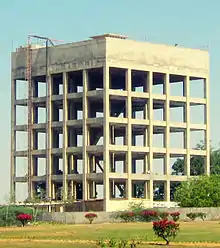Gulshan-e-Hadeed
Gulshan-e-Hadeed or Gulshan-e-Hadid (Sindhi: گلشن حديد ) (meaning Garden of Iron) is a neighborhood in the Malir District of Karachi, Pakistan. It was previously a part of Bin Qasim Town,[1] which was disbanded in 2011.

Gulshan-e-Hadeed
گلشن حدید | |
|---|---|
| Country | |
| Province | Sindh |
| Demonym(s) | Sindhi |
| Time zone | UTC+05:00 (PST) |
| Postal codes | 75010 |
| Population 2015 | 162567 |
Gulshan-e-Hadeed was built near Pakistan Steel Mills for housing its employees,[2] and thus the name. Gulshan-e-Hadeed's neighborhood was designed by Russian architects. The town is divided into three Blocks; A, B and C. Each block contains houses of a specific size as follows:-
- A-type house: 120 squares yards
- B-type house: 240 square yards
- C-type house: 500 square yards
Gulshan-e-Hadeed is divided into three Union-councils; UC-21, UC-22 & UC-23 of the Bin Qasim Town. The core of the area is made up of smaller "A-type" houses. Of late, most of houses facing the main artery of the area have been commercialized by owners.
Gulshan-e-Hadeed provides almost all necessary facilities for healthcare, education, business etc. Its streets and roads both are paved and the area is densely populated. Two and three-story houses seem to be increasing in number.[3]
The educational facilities in Gulshan-e-Hadeed are improving in quality and increasing in number with the passage of time. This Population to School ratio of this area is more than any other city or town in the entire country.
Demography
The ethnic groups in Gulshan-e-Hadeed include Sindhis, Muhajir, Punjabis, Kashmiris, Seraikis, Pakhtuns, Balochs, Brahuis, Memons etc. Most of the residents of Gulshan-e-Hadeed are employees of Pakistan Steel Mills and adjoining industries in Bin Qasim Town. Almost 50 percent population is Sindhi. Population of Gulshan-e-Hadeed has been growing due to heavy immigration from interior Sindh. Over 98 percent of the population is Muslim with small Christian and Hindu minority. Along with several mosques, Gulshan-e-Hadeed also has a church and a temple for its Christian and Hindu residents. The area is often considered as the most peaceful in the city with respect to law and order situation mainly because of being remote from the other towns of the city. Muhammad Ali a football player of H.U.F.C Football Youth Club lived in Gulshan-e-Hadeed.
Geography
Gulshan-e-Hadeed is a union council-6 of Bin Qasim Town , district [Karachi East]. It is 25-minutes drive (around 23 km) from Karachi’s Jinnah International Airport, adjacent to National Hiway while going towards Eastern side or Thatta. It's very close to the Link Road connecting National Hiway with Super Hiway. There are some illegal goth settlements on encroached land near Gulshan-e-Hadeed. There are roads leading to Gadap Town, Thatta and Hyderabad.
Development phases
Gulshan-e-Hadeed is divided into four parts:
- Phase I is a commercial and residential area. It includes about 2500 houses and a centrally located main commercial market that comprises many shops. In the center of Phase I lies Jamia Masjid Dayare Habib Trust. It is among the largest mosques in hadeed, and it regularly accommodates more than 3000 people at Friday prayers.
- Phase II is a residential and commercial area, comprising more than 4000 houses. In the start of Phase II there is a masjid called the Jamia Masjid Bab-u-Rehmat Trust. It is amongst the largest masajid in Bin Qasim Town, and it regularly gathers more than 3000 people at Friday prayers. Phase II has local small markets called "L markets" in each neighbourhood. There are fifteen such markets in Phase II and two main commercial marts.
- Phase II Extension is being populated at a rapid pace.
- Phase III which has been started to develop.
References
- "Bin Qasim". Archived from the original on September 29, 2006. Retrieved December 30, 2005.
- Report on the International Seminar on Shelter for the Homeless, Held at Karachi, Pakistan, 16-18, 1983. The Association. 1983-01-01.
- Bin Qasim Archived 2006-10-03 at the Wayback Machine